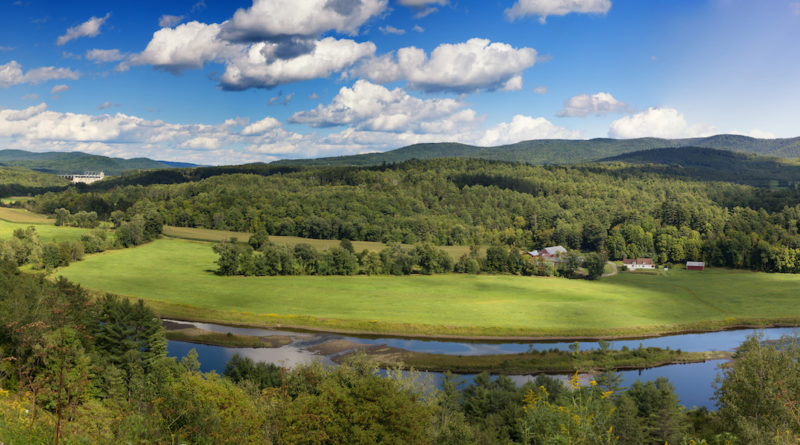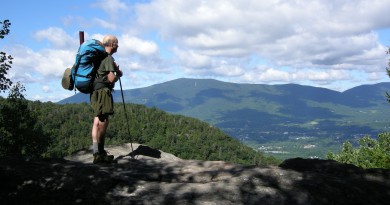A Portable Place
What is it about the Green Mountains, or any piece of wild, that stays with you and is so portable?
By Leath Tonino
Call me an enviro-nerd, but I’m obsessed with trying to see the human relationship with place—with places—from unique angles. Among other things (mountaineering, ancient Chinese poetry, pizza), this effort is what excites me, what turns me on.
So it was big news recently when, at the library, in a book, I stumbled upon a “version” of the Green Mountains that, while not new or original, is nonetheless fresh and useful. Specifically, what I stumbled on was the notion of portable places, i.e. specific terrains that travel with us: in our memories, our hearts—who knows how it all works.
For my part, I merely know that it does work, that once a bond has been established, a soulful connection forged, you can thereafter journey to the ends of the earth (I once worked in Antarctica, at the South Pole) yet still feel some certain special stretch of ground—the Greens in my case, especially the spine linking Mansfield to Mt. Abe—humming nearby.
Better yet, you can feel that certain special stretch of ground closer than nearby. You can feel it humming literally inside of you.
A compelling example (this is what I stumbled on at the library, what brought the notion of portable places into focus for me) is on display in Grizzly Years, a memoir authored by Doug Peacock, arguably our continent’s premier bear conservationist/interpreter/advocate/enthusiast. Friend of Ed Abbey, model for the character Hayduke in Abbey’s classic novel of ecosabotage The Monkey Wrench Gang, Peacock (who is himself a round, lumbering, ursine fellow) was a Green Beret medic in Vietnam, a witness to unspeakable horrors. Throughout his tour of muddy, bloody, ugly, nightmarish duty, he carried in his pocket a small creased topographic map of the Yellowstone backcountry—its valleys and streams and meadows and peaks and forests and canyons, its wildness and goodness, its familiarity, its mystery.
This two-dimensional representation, this micro-image of his favorite landscape, kept Peacock sane. It was a talisman, a shield, a safety blanket. It was a trusted brother during the dark sweaty terrifying jungle nights. And here’s my hunch: even had it molded to pieces, had it rotted away, the map still would have been with him, been in him, because its contour lines were inked… hmm… onto his memory, his heart?
Again, who knows.
Reading of Peacock and his cherished map, his portable place, I was reminded of a childhood pal of mine, a guy I’ve known since tykehood. Brad resides in Denver these days, and while he definitely enjoys the career that brought him west, his distaste for urban existence (read: his yearning for a quiet, rural life on a dirt road in the Greens) is hardly hidden, hardly hideable. We came of age together in the Vermont backcountry: some of our first legit backpacking experiences unfolded side by side on the Long Trail, many of our early forays into ice climbing were made on a shared rope in Duxbury and Bolton, large quantities of whisky were consumed in the glow of bonfires at various lean-tos, etc. Moose encounters, grueling marches, gutting fish in the rain, a canoe bending around a rock… the place got in us, deep.
This rich shared history—a history of our friendship not only with each other, but also with Vermont, a kind of tripartite friendship—returned to me as I read Grizzly Years, and it was accompanied by another anecdote.
A few summers ago, for old times’ sake, for the less-than-sober joy of it, Brad and I rendezvoused in the Rockies: set a camp, sat beside a jumpy creek, drank a lot of beer, reminisced for hours nonstop. In some of the stories that got told that weekend, we were both main characters (Camel’s Hump bivy, Lincoln Gap debauchery), while in a handful Brad was solo or I was solo or we were adventuring with different partners. Every story, though, was invariably about the tangled hills, the schist ledges, the ferns, the clouds, the hailstorms, the cold snaps, the moods of our natal habitat, or original home.
Sitting there beside the stream, some 2,000 miles from Burnt Rock Mountain and the Winooski River—from the source of our friendship, the elemental foundation of it—the Greens sprang alive in my mind, or maybe in the space between our two minds. Somebody else might not note anything interesting going on here (two buds tipping beers, spinning yarns about past times, past landscapes, past camps), but for me, given my obsession with the various ways that humans relate to places, I find it fascinating.
You could knock us for being nostalgic, for shutting out the present moment and retreating into the past, even for denying Colorado the attention it deserves: Why discuss Lewis Creek and the Champlain Basin when this creek, right at your toes, jumps in the sun? Well, sure. Of course. But you could also detect in this behavior, this conjuring of Vermont’s toponyms and textures, the force of place, the manner by which it forces itself into us (our memories? our hearts?), and the persistence with which it follows us wherever we go, no matter how far. You could note how place is portable, and how that portability is a kind of magic, and how magic is a gift.
Where was Peacock at the moment when the bullets raced overhead in Vietnameand his hand rose to graze the pocket harboring his Yellowstone map? And where, exactly, were Brad and I, cracking another round, raising a toast, laughing aloud?
Were we in Colorado, in Vermont, in both at once? Were we in that inner place, that memory-terrain, that heart-landscape? Call me an enviro-nerd, but my theory is that Vermont was sitting there with us, hanging out, three old pals, as ever.
Yes, the portable place, the magic.
If it were possible to leap backward to that weekend, that camp, I’d reach into the cooler’s icy slush, pause, and ask the Greens what they preferred—IPA or oatmeal stout?
Leath Tonino is a freelance writer from the Champlain Valley and the author of two essay collections about the outdoors, most recently The West Will Swallow You.



Love Leath’s essay: deeply insightful, eloquent, concise. More please. Thank you.
This is exactly how I feel, having just moved to Colorado from Vermont. My therapist said, “you’ll take Vermont with you everywhere you go” and I’ve wondered how to do that, but I think it’s as simple as it just always being alive inside me. I love how you humanized the state, because Vermont literally feels like my best friend, an entity I was fully in a relationship with. Love!
That is one of the loveliest things we’ve heard Emily! Thank you for sharing that.